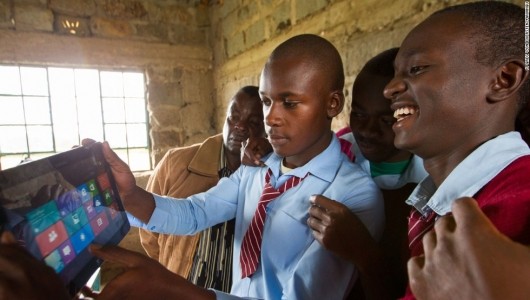Reducing Poverty Creates US Jobs

How does reducing global poverty create U.S. jobs? When people in developing nations transition from barely surviving, to middle and upper-class, they go from consumers of basic needs, like food or toothpaste, to consumers of more luxurious items like clothing, travel and technology. Reducing poverty opens giant, untapped markets for the United States. Luxury items like these are primarily operated by American companies, and an increase in demand for product stimulates more American jobs.
One in five American jobs is related to international trade in some way. In the last forty years, the impact that trade has on the U.S. economy has tripled.
The fastest-growing markets in the world are in developing countries, and 45 percent of the United States exports go to these areas. Foreign Policy Magazine states that the world’s poor is the largest untapped market on earth. “By building new markets overseas for American products, the International Affairs budget creates jobs and boosts the economy here at home,” says Governor Tom Ridge, former secretary of homeland security.
In fact, the majority of the U.S.’s top trading partners (the countries who buy our products, pouring money into our economy and providing jobs to thousands of Americans) used to benefit from U.S. foreign aid that helped them reduce poverty.
This is shown by the Marshall Plan. Implemented after World War II, the United States invested the equivalent of 110 billion dollars in both ally and enemy countries across Europe, helping them rebuild and reduce poverty.
Today, 240 billion dollars of American goods are exported to EU countries each year. The United States has made back double what their initial investment was in just one year of trade. What if this same principle is applied to developing countries?
The largest corporations in America understand the economic potential of untapped markets throughout the developing world, the subsequent boost in American jobs that accessing these markets could provide and the dire need for the United States’ foreign policy to invest in developing countries through aid.
In July 2012, over 50 major companies collaborated and sent a letter to Congress in support of the International Affairs Budget. It is in the economic interest of Google, IBM, CitiBank, Coca-Cola, Campbell Soup Company, Cargill, John Deere, Land O’ Lakes, PepsiCo, Walmart, Kraft, Johnson & Johnson and others to alleviate global poverty.
These companies wrote, “As business leaders, we know that U.S. economic growth is linked with global trade and the world’s economy like never before. As the U.S. Chamber of Commerce has noted, overseas markets represent 95 percent of the world’s consumers and 80 percent of global purchasing power. Trade already supports one in three U.S. manufacturing jobs, and these trends will become even more pronounced in the future. For all these reasons, we urge you to support a strong and effective International Affairs Budget. While just 1 percent of the federal budget, these programs are vital for achieving a more prosperous future for American businesses and the U.S. economy.”
One example of the economic potential that exists in developing nations is Indonesia’s 2011 Boeing deal. As Indonesia’s national poverty level diminished and their economy grew steadily, they became classified as a middle-income country, with help from aid investments by the U.S. and other nations. Boeing announced its largest deal in company history: 230 jets for 22 billion dollars with Indonesia’s Lion Air. Indonesia’s poverty decline has stimulated millions of new consumers of United States products, which also creates countless American jobs.
Tech companies see the consumer potential that exists in Africa; some estimate that there are over 1 billion untapped potential users of technology in Africa today. For this reason, companies are attempting to connect Africans to the internet. In Google’s Project Loon, high altitude balloons supply remote regions with beams of WiFi. Facebook has plans to fly 11,000 solar-powered drones to give Africa access to WiFi. Microsoft’s 4Afrika initiative is a 20-year plan. “ The Microsoft 4Afrika Initiative is built on the dual beliefs that technology can accelerate growth for Africa, and Africa can also accelerate technology for the world,” says their website.
Other companies are rushing to invest in Africa. Marriott estimates that Africa will be the next Asia in terms of economic development, and spent $200 million that will provide 23,000 more rooms across Africa. “Africa has significant untapped potential for travel and tourism, both as a destination and source of new global travelers. The continent’s GDP is anticipated to grow at over 5 percent annually over the next several years which we expect will raise more people into the emerging middle class,” said Arne Sorenson, CEO of Marriott.
The support that important American companies give to international aid, the rush of companies to become involved in developing regions, the United States’ history with aid investment and the importance of trade in the American economy all support the dire need for international aid investment in the world’s poor.
– Aaron Andree
Sources: The Borgen Project, Microsoft, Rural Poverty Portal
Photo: CNN
